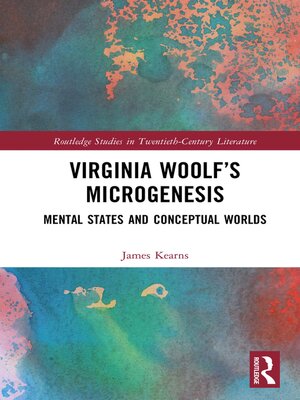Virginia Woolf's Microgenesis
ebook ∣ Mental States and Conceptual Worlds · Routledge Studies in Twentieth-Century Literature
By James Kearns

Sign up to save your library
With an OverDrive account, you can save your favorite libraries for at-a-glance information about availability. Find out more about OverDrive accounts.
Find this title in Libby, the library reading app by OverDrive.



Search for a digital library with this title
Title found at these libraries:
| Library Name | Distance |
|---|---|
| Loading... |
Virginia Woolf's Microgenesis engages with Virginia Woolf's writings in the context of her own unique methodological approach to mind, to meaning, and to making whole. This volume argues that this preoccupation with the metaphysics of "wholeness," a dread, indeed, of both fragmentation and what endures as an organic unity, places Woolf's writings alongside Jason Brown's microgenesis, formulated as a formative, emergent, and dynamic process of cognitive activity. However, crucially, it is not by assembling multiple flows of sense data into more complex constructions that we might perceive the objective world but by sculpting away the unfit to reveal the structure of the world as a surfacing reality. In so many ways, Woolf's novels represent an enactment of microgenetic theory, demonstrating and alerting us to the mind/brain state as a process of continual unfolding through progressive differentiation and discrimination to a distinct configuration – albeit one which may be deemed imperfect.
That is not to say that Woolf's fictions should be understood as anticipating Brown's formulation of microgenetic theory as such but that they should be understood as illuminating the adaptive and evolutionary significance, and signification, of perceptual microgenesis in her various modes of theorisation – that is, her processes of tunnelling and transmuting, moments of being/nonbeing, and depth‑and‑surface. If ontogeny (individual development) recapitulates phylogeny (species development), this volume demonstrates that Woolf provides the momentariness of microgenesis to her fictions, a process which recapitulates both.
Virginia Woolf's Microgenesis is essential reading for researchers and students in Woolf Studies, process philosophy, new materialisms, literary theory, and modernist literature.







